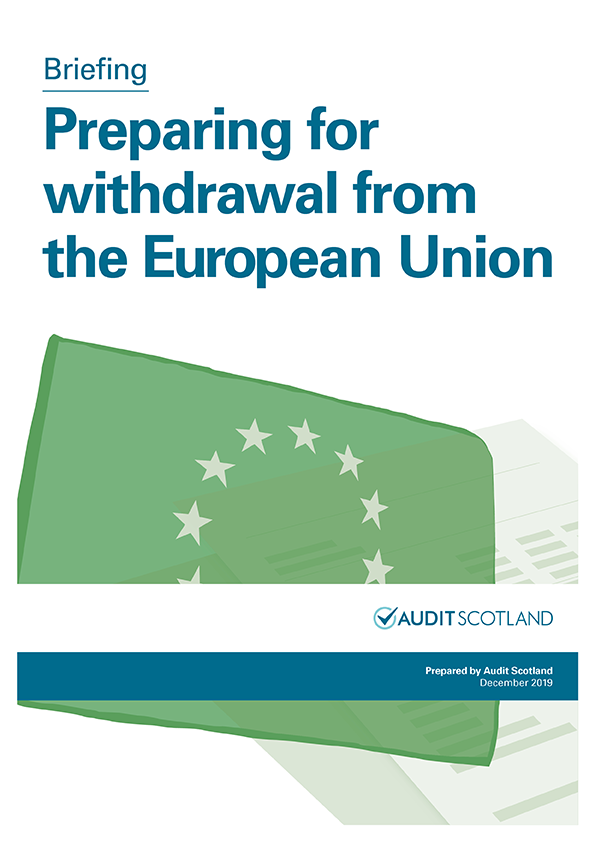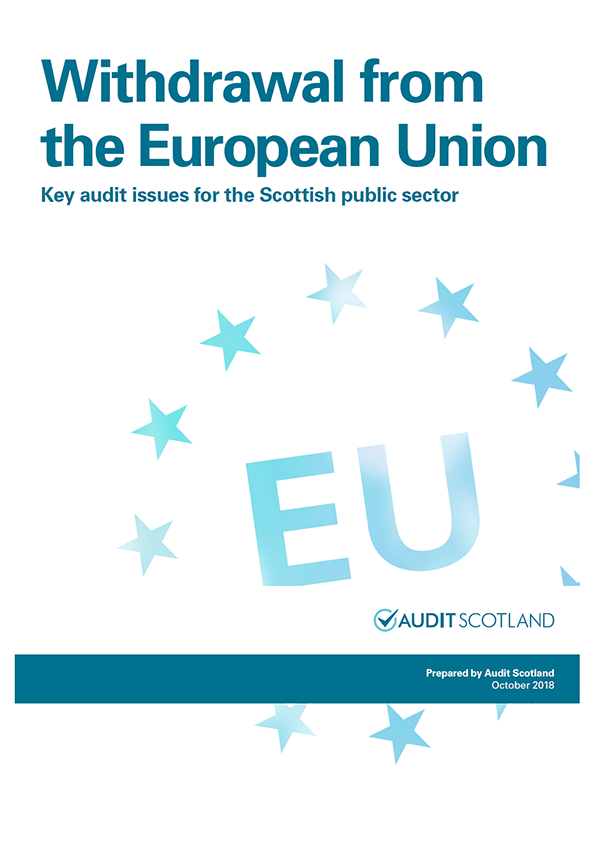Withdrawal from the European Union

The UK's decision to leave the EU represents a major constitutional change for Scotland and will affect everyone in Scotland to some degree. EU withdrawal comes at the same time as a significant expansion of the Scottish Parliament's financial powers and continued pressure on public sector budgets. This e-hub includes the papers we've produced so far and other resources.
Our latest paper focuses on how the Scottish public sector has been preparing for EU withdrawal. It highlights ongoing issues and potential risks, and features some examples of activity that public bodies have undertaken to date. It also suggests questions for public bodies to consider in their ongoing preparations for EU withdrawal.
Preparing for withdrawal from the European Union
Key questions for public bodies
Public bodies should consider the following questions in their ongoing planning for EU withdrawal:

- What have we learned from our preparations to date for the UK's withdrawal from the EU?
- Has the extended timescale for EU withdrawal generated any new risks for our organisation?
- How are we ensuring our planning for EU withdrawal is proportionate to the level of risk to our organisation and relative to other business risks?
- Does our medium- and long-term financial planning consider the potential impact of EU withdrawal?
- Are we continuing to provide effective support for colleagues from elsewhere in the EU?
- Are our workforce planning arrangements reflecting any changes in workforce pressures in our organisation, or that of the organisations and sectors we work with?
- Are we assured that we have appropriate contingency arrangements in place to protect our supply chains and manage the cost and availability of products and services?
- How might we need to adapt our work once the UK has left the EU?
Case studies

Continuity of medicines and other medical supplies
A number of UK and Scottish bodies, such as NHS National Services Scotland, have a role in stockpiling supplies and contingency planning.
Read more in the paper...

Continuity of food supplies
Scotland Excel, which provides a shared procurement service for Scotland's councils, undertook contingency planning to ensure continuity of food supplies following the UK's departure from the EU.
Read more in the paper...

Planning for legislative changes in Food Standards Scotland
Food Standards Scotland started a programme of work in 2016, aimed at protecting consumers following the UK’s exit from the EU.
Read more in the paper...

Financial planning in the Scottish Police Authority
The Scottish Police Authority's planning has included requirements for Police Scotland officers to provide support at the border and to customs officials, deal with potential civil unrest, or support other services in the UK.
Read more in the paper...
Annual audit reports
We have produced a summary of issues relating to European Union withdrawal which have arisen in health and local government annual audit reports.
Withdrawal from the European Union - key audit issues
In 2018, we produced a paper looking at key audit issues for the Scottish public sector.
The paper highlights what we think might be key issues for the bodies we audit. It suggests questions that all public bodies should be asking themselves, and sets out our current plans for reflecting EU withdrawal in our audit work.
Download the key audit issues paper - PDF 127Kb - Opens in a new window
Key facts from our key audit issues paper
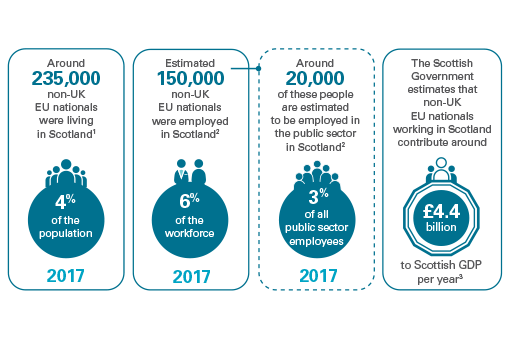
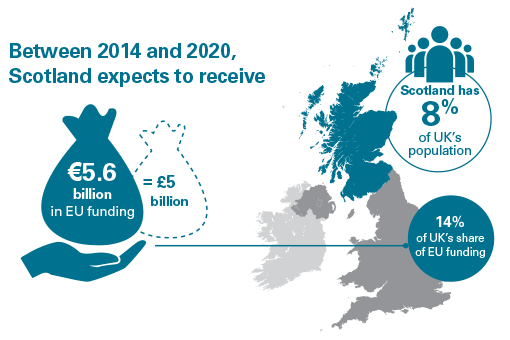
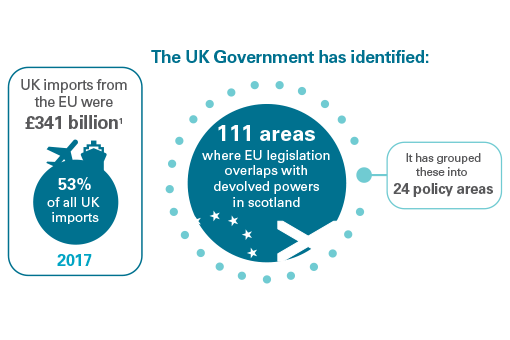
Around 235,000 non-UK EU nationals were living in Scotland - 4% of the population - in 2017.
Estimated 150,000 non-UK EU nationals were employed in Scotland - 6% of the workforce - in 2017. Around 20,000 of these people are estimated to be employed in the public sector in Scotland - 3% of all public sector employees - in 2017.
The Scottish Government estimates that non-UK EU nationals working in Scotland contribute around £4.4billion to Scottish GDP per year.
Between 2014 and 2020, Scotland expects to receive 5.6 euros billion in EU funding (equivalent £5 million) - 14% of UK's share of EU funding. Scotland has 8% of UK's population.
The UK Government has identified:
- UK imports from the EU were £341 billion in 2017 - 53% of all UK imports
- 111 areas where EU legislation overlaps with devolved powers in Scotland. It has grouped these into 24 policy areas
Other resources

Reporting on EU withdrawal
We will continue to monitor and report on the impact of EU withdrawal on the Scottish public sector through our annual audit reports and key performance audits. You can find a full list of Audit Scotland reports on our website.
National Audit Office (NAO)
The NAO has produced a hub on 'Exiting the EU' - Opens in a new window, which draws together all its work on the UK leaving the EU. It has a number of publications on areas such as supplying the health and social care sector in the event of leaving without a deal, and preparing for trade negotiations.
Scottish Government
The Scottish Government has published information on a wide range of subjects related to leaving the EU and how it may affect people and businesses in Scotland, including civil rights, agriculture, education, health and social care and financial services.
Scottish Parliament Information Centre (SPICe)
SPICe has produced an information hub - Opens in a new window compiling a range of sources on the UK’s decision to leave the EU, the process for leaving and negotiations for a new relationship between the UK and EU. It also provides regular updates - Opens in a new window on the status of negotiations between the UK and EU, the UK Government’s approach and details of the Scottish Government’s and the other Devolved Administrations’ positions.
